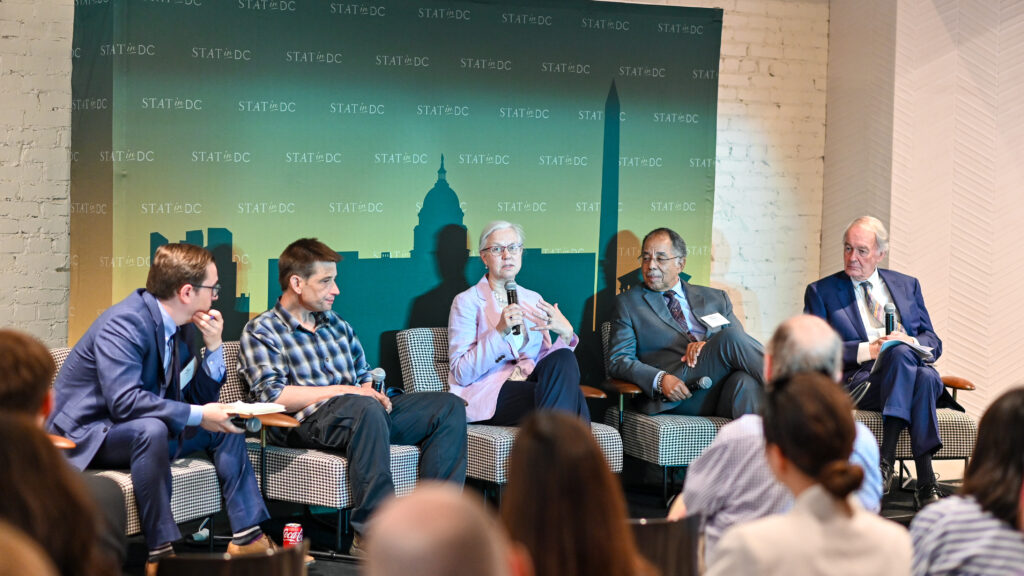WASHINGTON — Nicholas Voyles, executive director of the Indiana Recovery Alliance, ended up missing his daily dose of methadone on Monday. He’d requested “guest dosing” before traveling to Washington, but discovered that day that the paperwork hadn’t been processed yet. Although he has requested guest doses in clinics across America, Voyles told an audience at the STAT policy in health care meeting, the process has only worked a single time.
“A paperwork misplacement allowed me not to dose,” Volyes said. “For me, it’s a little different. I’ve been taking methadone for a long time. But if I was a year in or something, this would be withdrawal — acute withdrawal.”
advertisement
Methadone, which is among the most effective medications for opioid addiction recovery, is heavily restricted and can be difficult to access in the U.S., where over 80,000 people die from opioid overdoses annually. It’s only available at specialized clinics, where many patients are required to report in person each day to receive a single dose.
Methadone treatment has been shown to significantly reduce overdose deaths from illicit drugs such as fentanyl and heroin — although it is itself an opioid and can cause sedation or even overdose when misused.
Still, during the Covid-19 pandemic, when the federal government eased methadone clinic regulations and more people had access to take-home doses, the benefits seemed to outweigh the risks of increased methadone access.
advertisement
“Those concerns either with increases in methadone-related overdose deaths, diversion, harms didn’t happen,” said Yngvild K. Olsen, director for the Center for Substance Abuse Treatment at SAMHSA. “Part of what we at SAMHSA were able to do was weigh the evidence around the lack of significant harms with those increased flexibilities, as well as some evidence that showed that people were able to stay in care longer. And that’s been part of the calculus that went into being able to say, ‘we’re going to make those flexibilities permanent.’”
Although the federal rules have been updated to allow many of those Covid-era flexibilities to become permanent, methadone regulation and access still vary widely state-by-state. Sen. Edward J. Markey (D-Mass.) has introduced a bill for expanding methadone access, which would become the biggest reform to the addiction treatment system since the Nixon administration.
The legislation would allow 7,000 physicians trained in addiction medicine to prescribe methadone so that people could access it outside of the clinic, and it would allow more patients to pick up a methadone prescription at their local pharmacies. Notably, the bill has bipartisan support from Republican Senators Rand Paul of Kentucky and Bill Cassidy of Louisiana.
“That Bill has now passed the Senate Health Committee by over 16-5, and it’s Markey, Rand Paul, and Bill Cassidy. So, hell is freezing over with this bi-partisan bill that is in a Congress that many times is too divided. And it’s on the major change in 50 years of methadone policy,” Markey said.
Today, a majority of methadone clinics operate as for-profits, and nearly one-third are owned by private equity firms. Edwin C. Chapman, a physician with decades of experience treating addiction, left his role at a methadone clinic in 2000 because he felt that the clinic’s business model conflicted with his patients’ best interests.
“It was very clear that the structure was not designed for the patient, that it was a business model that was really designed to keep patients controlled, but not necessarily to get better,” Chapman said.
Despite the bipartisan support that Markey has already garnered, he does not expect an easy battle. The methadone clinics have lobbying power and a lot of money on the line.
“Obviously, it’s the OTP’s — which is opiate treatment programs — that are going to lobby this city,” Markey said. “This city really created the problem with the war on drugs, and it’s now the place that the opiate treatment clinics are going to try to get Senators and House members to block solutions that should be put in place.”
Voyles said that he hopes Markey’s legislation will pass. To Voyles, increasing access to methadone outside of the clinic would mean granting thousands of people more power over their lives.
“I’m a patient and I represent thousands of patients who are saying, we want a choice,” Voyles said. “We want to be able to have an OTP if you want more structure, or we want to be able to live without them.”

